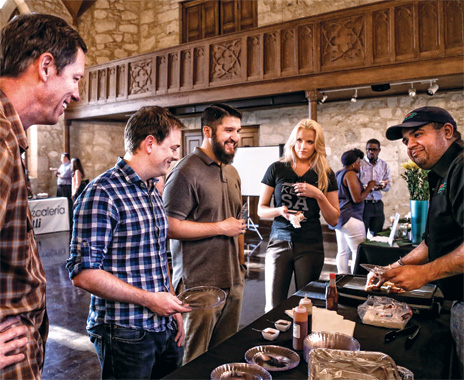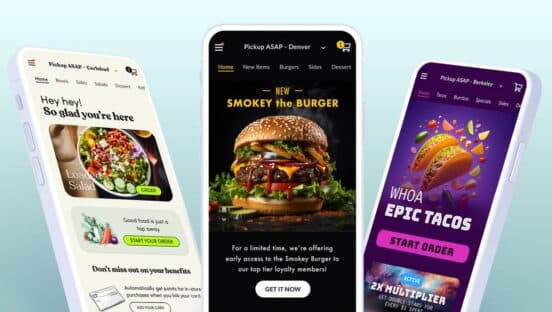When Manny Carral started Revolucion Coffee + Juice in San Antonio four years ago, he thought he was going into unfamiliar territory. The California transplant had no background in food or beverage service and had recently moved to Texas. And while his new career path was full of twists and turns, one thing that guided Carral was the tech startup mindset that he had developed during his years in high-tech sales marketing.
“We’re trying to leverage the tech models for growth, for innovation, even software development,” Carral says. “[We do] standup meetings, streamline, get the product out to market sooner, and then reiterate.”
This gives the local vegetarian food-and-beverage chain a competitive edge. Relying heavily on innovation allowed the shop to pivot quickly when, during its first year, it became clear that consumers were more interested in Revolucion’s special cold-pressed juices and homemade nut milks than coffee.
Carral is one of many former tech workers who have turned to foodservice in recent years. Technologists are making the switch for a variety of reasons: burgeoning foodie culture, the promise of a good return on investment (everybody eats), and the excitement of creating something new. But perhaps most alluring is the promise of disrupting and improving the existing food system.
Though it may seem like technology has already transformed everything, foodservice has remained relatively untouched. The idea of “food and tech” often brings to mind POS systems, social media, or online ordering. But while technological tools can advance the industry, the intersection between food and tech has far greater implications for the limited-service restaurant industry. The overall mindset, product offerings, food supply, and communication are poised to change.
Ryan Salts, cofounder of Break Fast & Launch, a culinary business accelerator in San Antonio, has found that one of the biggest problems passionate food entrepreneurs face is “seeing the business as a business.” That’s why, in addition to bringing in food-industry veterans, Break Fast & Launch invites tech-sector experts who thrive in business to speak with participants.
Tech philosophies like “fail fast,” which refers to acting on an idea quickly, seeing if it works, making improvements, and trying it again or moving on, can be useful in business.
Salts describes a recent moment when Michael Girdley, Break Fast & Launch mentor and cofounder of San Antonio coding boot camp Codeup, told aspiring food entrepreneurs to think of themselves as technicians.
“That made the light bulb go off,” Salts says. To explore the details of their food concept, would-be operators must conduct market research, understand the need for the product and its audience, invite consumers to try it and make suggestions, and determine the story and mission of the business—often all before introducing technological tools into the equation.
Carral of Revolucion Coffee + Juice participated in Break Fast & Launch to focus on his new kombucha spinoff. He says he is always thinking about how to innovate with packaging and products, how to adopt a lean business model, and how to streamline. That mindset has helped bring Revolucion to a nearly paperless state.
He has also relied on the tech concept of reworking products and ideas to minimize waste from Revolucion’s cold-pressed juices, which use 3–5 pounds of produce per 16-ounce bottle. Carral makes extra juice into paletas (Spanish-style popsicles). Excess meal from the nut milk is turned into flour for vegetarian chips.
Technology-inspired innovation isn’t all in the mind, however. Evan Conover, a media representative for Wintergreen Marketing and an industry consultant, is a regular at food-technology conferences around the world. He predicts that food and tech will increasingly intersect in the physical and practical sphere. For example, in the future, he says, there will be “all kinds of algorithms that tell you where to eat” based on minute preferences.
Conover sees these technological developments providing exciting opportunities for quick serves and other restaurants. “[They’re] the ones that are poised to be the first bringers of this stuff into the market. People go out for the experience of trusting you to bring them good food,” he says.
Nevertheless, it’s important to remember some critical differences between the food and tech worlds, particularly in its risk level.
“Food is far less buzz-wordy,” Salts says. “No one is ‘crushing it’ or ‘killing it’ because their livelihood is literally attached to these businesses. You can go bankrupt from a food business [closing]. You can probably avoid it in a tech business.”
Salts says tech can learn from food, too, specifically in regards to community. “Food is a huge community builder,” he says. “Food people know how to interact with the community.” For Break Fast & Launch, which in some ways resembles a tech business incubator, that community has become the heart of the program.
For Carral, the network was among the most valuable things he gained from the accelerator program. Because of its intense peer-to-peer emphasis, attendees become close with people they might work with, help, or be helped by in the future.
“At the end of the day, we all count our inventory the same, we chop onions the same,” Salts says. “At the end of the day, we succeed together and not individually.”
That community spirit will be important to maintain as the industry increasingly embraces the tech mindset and the (positive) disruption that follows it.







